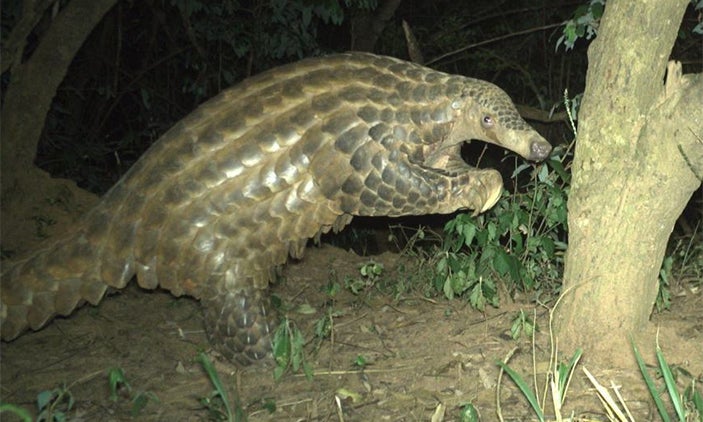Pangolin scales smuggling: a wildlife crime Uganda continues to battle
East African nation has all four species of the most-trafficked mammal in the world

Your support helps us to tell the story
From reproductive rights to climate change to Big Tech, The Independent is on the ground when the story is developing. Whether it's investigating the financials of Elon Musk's pro-Trump PAC or producing our latest documentary, 'The A Word', which shines a light on the American women fighting for reproductive rights, we know how important it is to parse out the facts from the messaging.
At such a critical moment in US history, we need reporters on the ground. Your donation allows us to keep sending journalists to speak to both sides of the story.
The Independent is trusted by Americans across the entire political spectrum. And unlike many other quality news outlets, we choose not to lock Americans out of our reporting and analysis with paywalls. We believe quality journalism should be available to everyone, paid for by those who can afford it.
Your support makes all the difference.On May 24, the Uganda Wildlife Authority (UWA) announced they had arrested three suspects from Arua Town in possession of 300kgs of pangolin scales.
This was one of many such cases including another one in 2019 at Elegu, a border town to South Sudan in Northern Uganda, where Uganda Revenue Authority officials impounded 750 pieces of ivory and thousands of pangolin scales with an estimated value of £5.7 million. This was the country’s biggest seizure.
A pangolin is a small, shy and harmless creature with tough overlapping keratin scales.It is the only mammal known to have such large protective keratin scales covering their skin. They are made from the same material that makes up human fingernails and rhinoceros horns.
Small as it is, it’s the second most smuggled wildlife item after Ivory in Uganda. According to Traffic, a wildlife trade monitoring NGO, pangolins have been heavily targeted for poaching and trafficking in Uganda. Between 2012 and 2016, over 1,400 pangolins were seized.The pangolin scales trade is majorly driven by the demand from Asian countries, mostly China and Vietnam.
The Convention on International Trade in Endangered Species (CITES), placed the pangolin in Appendix 1, which means they are critically endangered and in 2016 they voted to ban the commercial trade in pangolins.In 2019, the Parliament of Uganda enacted stringent Uganda Wildlife Act 2019 with the aim of protecting wildlife and strengthening conservation. According to the Act, anyone hunting, possessing, selling, or buying protected species commits an offence and is liable to a maximum fine equivalent to £40,000 or to life imprisonment or both.
Uganda is home to all four of the African species; the Tree/ White bellied pangolin (Phataginus tricuspis), Giant pangolin (Smutsia gigantean), Cape/Temminck’s Ground pangolin (Smutsia temminckii), and the Long tailed Black Bellied pangolin (Phataginus tetradactyla).
The pangolin is trafficked because of its meat, which is a delicacy to the Chinese, and for its scales, which are used as an ingredient in the Traditional Asian medicine, mostly used in China and Vietnam. It’s believed to be a cure for ailment ranging from heart disease, cancer and myriad medical conditions like helping to drain pus and relieve skin diseases, although there is no scientific evidence to support their claim.
The scales in traditional Chinese medicine are boiled to remove the scales which are later dried and roasted after they are sold based on claims that they can stimulate lactation.
Back home, most people eat it as bushmeat and this is mostly done by the elderly people. Pangolin wine is also another product which they get from it. First, they boil rice wine with a baby pangolin. It’s said that the wine improves breathing.

This article is reproduced here as part of the Giants Club African Conservation Journalism Fellowships, a programme of the charity Space for Giants and supported by the owner of ESI Media, which includes independent.co.uk. It aims to expand the reach of conservation and environmental journalism in Africa, and bring more African voices into the international conservation debate. Read the original article here.
Join our commenting forum
Join thought-provoking conversations, follow other Independent readers and see their replies
Comments